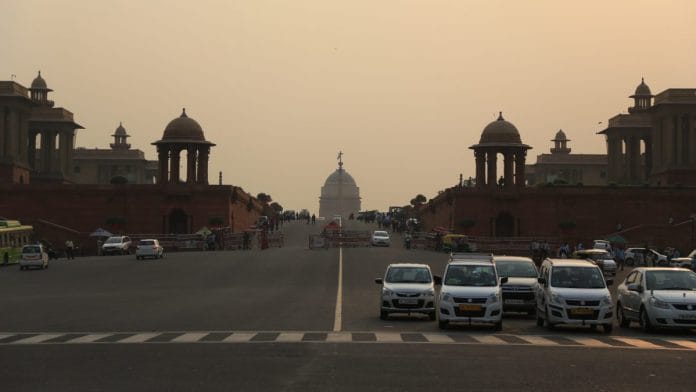New Delhi: Government employees looking to express their grievances with the central government’s decisions and policies have been increasingly taking to social media, and the Modi government is not pleased.
In recent months, officers of the Central Armed Police Forces (CAPF), the Indian Forest Service and, most recently, the railways services have all taken to Twitter and Facebook in large numbers to run campaigns to either oppose certain government decisions or to draw its attention to issues simmering within their cadres.
Social media has emerged as a favoured tool of protest for government employees who fear backlash in raising grievances through traditional means. While approaching the government through their individual professional organisations holds the prospect of backlash, officers say, representations seldom elicit replies.
There are explicit rules prohibiting government officers from criticising the government through traditional means like media statements, but social media gives employees some wiggle room on account of being new.
At least two ministers of the union government, Amit Shah and Piyush Goyal, are said to have expressed their annoyance with this mode of protest at meetings with officials. But government officers say their hands are tied.
It is the only way to deal with an unresponsive government, said retired CRPF officer S.S. Sandhu.
“Earlier, governments would at least hear out their own officers… Nowadays, there is no response from the government, no matter how many representations you send through formal channels,” he added.
“The fact that a large number of officers are taking to social media to make their voices heard shows how they have become desperate in the face of an arrogant and unresponsive government,” he added. “At least, this way, the public gets to know how those working for the government are being treated.”
Also Read: Can run railways without you, Piyush Goyal tells officers angry about merger of 8 services
Not holding back
Over the last few months, CAPF officers have been running a campaign on social media to demand an end to what they call the “hegemony” of IPS officers in the BSF, CRPF and other central police forces.
With hashtags like #IPSGoBack and #Justice4CAPF, they have consistently sought to draw the government’s attention to the “unfair conduct” of IPS officers who come on deputation to their forces and are given leadership roles.
Similarly, officers from the relatively lesser-known forest service have run sustained campaigns on social media to demand better government protection for staff, who often find themselves facing angry encroachers and poachers, among others, in the line of duty.
The most recent instance of social media campaigns — also perhaps the most direct criticism of the government — is the one mounted by officers peeved with the merger of eight railways services.
Since the merger was announced last month, young officers have come out on Facebook and Twitter in large numbers to criticise the “arbitrary” move.
Without using anonymous or pseudonymous handles, officers have demanded a rollback or at least tweaking of the reform.
Why government is unhappy
The government has not taken the social media campaigns lightly.
In the case of the CAPF officers, Home Minister Amit Shah is known to have expressed his displeasure with the “inability” of the forces to resolve an inter-service tussle amicably and allowing it to fester on social media for so long.
Disciplinary warnings were also issued to officers seen as “embarrassing” the government publicly.
Similarly, Railways Minister Piyush Goyal is learnt to have taken strong exception to railway officers criticising the government on social media, and even told off some employees for doing so.
“The perception in the government is that this is like washing one’s dirty linen in public,” a senior officer said. “Right now, there are no specific… guidelines prohibiting officers from venting their displeasure about service conditions on social media, but the conduct rules in general are very explicit and they ought to be followed in spirit on social media as well.”
Also Read: All you want to know about the 8 railway services set to be merged, and the role they play
‘Strength in numbers’
There are many reasons why social media has become the central point for disgruntled officers and employees.
“More often than not, social media offers you the protection of anonymity,” said a CRPF officer who runs an anonymous handle on Twitter. “One can say a lot through an anonymous handle without putting yourself in the spotlight and invite disciplinary action from the government.”
There is also strength in numbers, officers across services argue. While it is easy for the government to penalise individual officers for criticising the government on social media, a crackdown is hard when hundreds of officers come together to demand something, said a railways officer.
“What we saw in the case of railways — young officers not hiding their identities and coming out on social media aggressively — is unprecedented in some ways,” said the officer.
“As their seniors, we told some young officers to be careful, but the fact is they have the strength of numbers.”
Finally, there is also the “reach factor”, said an IAS officer.
“If the IAS Association writes to the government regarding a problem, how many people would know?” he said. “But if you turn the problem into a social media campaign, you make the public aware of the issue, and there is some degree of pressure on the government to at least take cognisance of it.
“In this day and age, when people don’t have the time to physically come together and deliberate issues, you can easily discuss an issue over WhatsApp and then popularise it by putting it out on Facebook and Twitter,” the officer added.
Also Read: Arbitrary, betrayal — officers outrage over Modi govt move to merge railway services







Run the Railways OR Ruin the Railways?